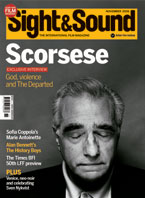Container
Sweden 2006

Reviewed by Henry K. Miller
Synopsis
Our synopses give away the plot in full, including surprise twists.
The images and soundtrack in Container are formally separate: there is no diegetic sound, and the voiceover, which comprises the entire soundtrack until the closing minutes, when it's accompanied by an electronic drone, bears no direct relation to the action on screen. The image track follows a dejected occasional transvestite, sometimes accompanied by a young woman, through a number of locations in an unnamed city, a landfill site and a seemingly deserted hospital. The soundtrack is a continuous off-screen monologue by someone who may or may not be the American actress Jena Malone.
Review
Back when Lukas Moodysson was being called "the new Bergman", the old Bergman publicly hailed the arrival of "a genius film narrator". Flash forward to the disastrous A Hole in My Heart (2004) and the young master found himself "tired of the dictatorship of traditional story arcs". Get the picture, Ingmar? But what sounds like a rebuff could be veiled tribute: if Bergman's Persona is solid art-house 'canon fodder', it contains passages that could easily have been clipped from the contemporary avant garde. By abandoning narrative altogether, Moodysson has travelled still further toward the gallery film. Container's 74-minute run-time feels arbitrary: you could walk in at any point and get the gist of the thing. For all that, it shares with Persona the central theme of the fragmented self in a violent, godless world.
Shot in grainy black and white, the soundless universe of Container, unidentified within the film but patched together from Romania, Sweden and the area around Chernobyl, is a vision of personal misery and social and environmental breakdown that makes the hellish tenements of Lilja 4-ever (2002) look like the salubrious Stockholm suburb in Together (2000). "English journalists," says Moodysson in a thoughtful directorial statement, "damage their intelligence by being so very happy with how intelligent they are". But I'm happy to admit that the roles performed by Peter Lorentzon and Mariha Åberg within this monochrome wasteland are not easily deciphered. For most of the film Lorentzon acts out various poses of despair: falling over himself in his apartment, half-heartedly attending an orgy, and sticking a model foetus on to his face. If we take American actress Jena Malone's ( Donnie Darko, 2001) stream-of-consciousness narration to be this character's inner voice (she claims to be "a girl in a boy's body") then Åberg, more dancer-performance artist than actor, could be interpreted as a projection of Lorentzon's idealised self.
The foetus-model, various flash-montages of religious iconography, and the possibility that Lorentzon is in the hospital for a sex-change operation, together with running references to dilation on the soundtrack, add up to a slightly obscure discourse on rebirth or regression. The director has claimed with relish that if only four people liked A Hole in my Heart, "maybe seven" will like Container. But despite him, this film's secret weapon, its populist touch, is the voiceover. An emo icon on the strength of Donnie Darko, in which she played Donnie's doomed girlfriend, Malone reportedly got the part after writing Moodysson a fan letter. Her strange soliloquy comes over like a late-night LiveJournal post - or like Alma in Persona, provoked by the images' silence to spill secret desires and obsessions. Whose desires and obsessions is left ambiguous. Sometimes explicitly identifying herself ("my name is Jena Malone; I've never been to Sweden before"), at other times she claims to be a hotel cleaner fantasising about being one of the stars she cleans up after. "I saw this thing on TV about Sudan," we learn; when she's done with the movie, she's flying there to "fix" it. But just getting to the airport is so hard… Malone has called her performance "honest and intense". Intense is right, but its chief virtue is its slipperiness; her thoughts on Sudan, fame ("a nightmare you become addicted to") and self-harm ("I just do what everybody else does") are all delivered in exactly the same neutral whisper, making it impossible to figure out what's important to her, what's in-character, what's self-parody.
It's no surprise to find a certified Euro-auteur like Moodysson sneering at Hollywood starlets, but what's Malone up to? If Container's Berlin premiere hadn't preceded its announcement by a few months, Malone's riffing on Sudan could easily be taken as a comment on her contemporary Lindsay Lohan's consciousness-raising mission to Kenya. ("I want to set up orphanages for underprivileged and abused children. That's the main thing I'm focusing on in my time off," read a press release that contrived to name-check Kate Bosworth and Bono.) Yet there's nothing in Malone's tone to indicate whether the viewer should be laughing at or sympathising with her creation. Though one may suspect satirical intentions on Moodysson's part, Malone's toying with her own star persona is considerably more compelling than the murky gender-political dumb-show of the film on the screen.
Credits
- Directed by
- Lukas Moodysson
- Written by
- Lukas Moodysson
- Directors of Photography
- Lukas Moodysson
- Jesper Kurlandsky
- Editors
- Lukas Moodysson
- Jesper Kurlandsky
- Andreas Nilsson
- Music
- Erik Holmquist
- Jesper Kurlandsky


